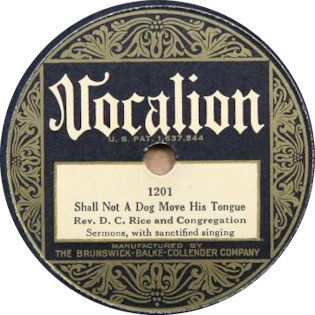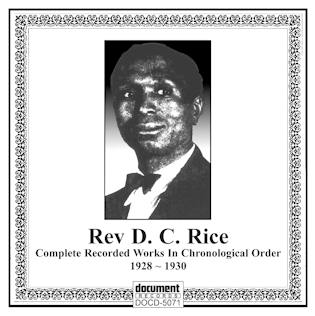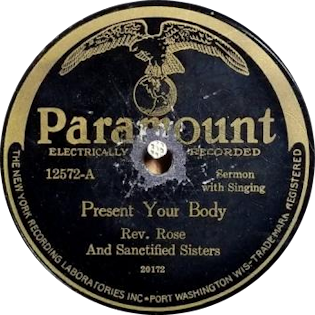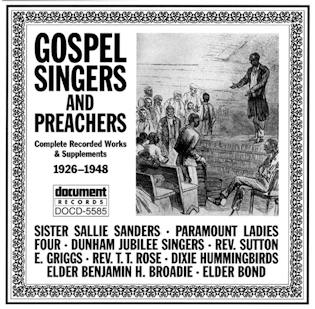 A B C D E F G H I J K L M N O P Q R S T U V W X Y Z
A B C D E F G H I J K L M N O P Q R S T U V W X Y Z
To help with further browsing click on the large ‘Initial’ to return to the Early Gospel Singers Introduction, or click another initial to take you to details of more early gospel singers.
____________________________________________________________________________________________________________________________
| Name: | Rev. William Ransom |
| Born: | |
| Died: | |
| Biography Synopsis: | Recorded four sermons in Atlanta, Ga. assisted by Sisters Callie Hunter and Pauline Tidwood, and Brother William Christopher. – Blues & Gospel Records (1890-1943), Dixon, Godrich & Rye, 4th Edition, Oxford University Press, Oxford, UK, 1997 |
| Recording career: | 1927 |
| Most popular song(s): | |
| Musical Influences: | |
| References / links: | |
| Images: |
| Name: | Dock Reed |
| Aka: | Born Zebediah Reed he recorded many songs with his cousin Vera Hall Ward |
| Born: | Sunter County, Alabama, 1898 |
| Died: | 4th January, 1974 |
| Biography Synopsis: | Alabama farm worker Dock Reed and his cousin Vera Hall Ward were both recorded by Alan Lomax for the Library of Congress. Dock, by all accounts, was a deeply religious man who never sang secular music, while Vera was known to perform a few of these “sinful” songs. – Smithsonian Folkways (http://www.folkways.si.edu/albumdetails.aspx?itemid=151)Dock Reed and his cousin Vera Ward Hall were perhaps John Lomax’s favorite performers, comparable, if not superior, in artistry, he believed, to Lead Belly….. Jo Tartt, Jr., a white friend who made a striking photograph of Reed in 1970, depicted this farmer and basket maker as a “south Alabama preacher, molasses maker, [and] cedar fence-post cutter.” – Association for Cultural Equality (http://www.culturalequity.org/alanlomax/ce_alanlomax_profile_doc_reed.php) |
| Recording career: | 1937 – 1974 |
| Most popular song(s): | |
| Musical Influences: | |
| References / links: | Biography by Peter Stone on ‘Association for Cultural Equality’ website:(http://www.culturalequity.org/alanlomax/ce_alanlomax_profile_doc_reed.php) |
| Images: |
| Name: | Mrs L. Reed & Mrs T. A. Duncans |
| Location: | |
| Born: | |
| Died: | |
| Biography Synopsis: | |
| Recording career: | |
| Most popular song(s): | |
| Musical Influences: | |
| References / links: | |
| Images: |
| Name: | Rigoletto Quartet Of Morris Brown University |
| Location: | Atlanta, GA – now re-classified as Morris Brown College |
| Biography Synopsis: | Originating in circa 1923 and still active as the Morris Brown College Band |
| Recording career: | 1926 |
| Most popular song(s): | |
| Musical Influences: | |
| References / links: | Morris Brown College – Wikipedia |
| Images: | 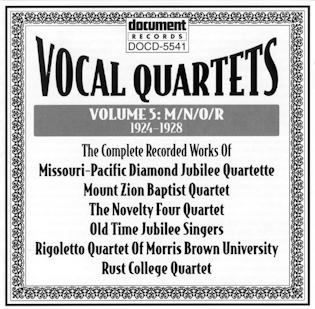 |
| Name: | Roberta Martin Singers |
| Biography Synopsis: | The Roberta Martin Singers were an African-American gospel group based in the United States. The group was founded in 1933 by Roberta Martin, who in that same year had just become acquainted with the then new trend of Christian music known as gospel, which was different than the traditional spirituals which were popular at the time. Theodore Frye and Thomas A. Dorsey were directing a junior choir at Ebenezer Baptist Church in Chicago, Illinois, and asked Martin to serve as the accompanist. From this junior choir, Martin selected six young men at random to form a group, Eugene Smith, Norsalus McKissick, Robert Anderson, Willie Webb, James Lawrence, and W.C. Herman (who lost his life in World War Two). This group was named the Martin and Frye Singers, and in 1936, the group adopted the name of The Roberta Martin Singers. The Roberta Martin Singers (RMS) were well known for their unique sound, which contained no traditional bass, but a dark treble sound with the elasticity that the new music required. For a brief period of time, the group was known as the Martin and Martin Singers, when Sallie Martin joined Roberta’s group. That venture was short lived. In 1939, Anderson briefly left the group and returned in 1941 before departing for a final time in 1943, also in 1939, Martin added the first female voice to the group, Bessie Folk. – Wikipedia (http://en.wikipedia.org/wiki/The_Roberta_Martin_Singers) |
| Recording career: | 1933 to the present day |
| Most popular song(s): | |
| Musical Influences: | |
| References / links: | |
| Images: |
| Name: | Elder David Ross |
| Location: | |
| Born: | |
| Died: | |
| Biography Synopsis: | |
| Recording career: | |
| Most popular song(s): | |
| Musical Influences: | |
| References / links: | |
| Images: |
| Name: | Royal Harmony Singers (The Florida Boys) |
| Location: | Cincinatti, OH |
| Biography Synopsis: | The Royal Harmony Singers had a long career, later changing their name to The Jubalaires and recording both gospel and secular on the Cincinatti-based King label. They were a highly skilled male jubileee foursome in the tradition of the Golden Gate Quartet.
_____________________________ The Jubalaires were an American gospel group active during the 1940s and 1950s. The group initially went by the name, The Royal Harmony Singers, as far back as 1936 and under that name reached #10 on the R&B charts on November 14, 1942, with “Praise the Lord and Pass the Ammunition”, a song adapted from the speech of a naval chaplain in response to the attack on Pearl Harbor the previous year. In 1946, the Jubalaires secured a spot on Arthur Godfrey’s CBS radio show. Willie Johnson left the Golden Gate Quartet to take the lead of the group in 1948, and in 1950 the band appeared in the musical comedy film, Duchess of Idaho. Much of the Jubalaires’ music was initially issued by Queen Records, a subsidiary of King Records specializing in African-American music; later reissues appeared on King Records proper. The band recorded with Andy Kirk on November 27, 1945, a session which produced the Decca Records 78rpm release, “I Know/Get Together With The Lord”, and credited to Andy Kirk & His Orchestra With The Jubalaires. A third track recorded during the session, “Soothe Me”, went unreleased. Other Jubalaires’ releases included “Before This Time Another Year/Ezekiel (Saw The Wheel A Rollin’)” (Decca), “God Almighty’s Gonna Cut You Down/Go Down Moses” (King), and “My God Called Me This Morning/Ring That Golden Bell” (King). The Jubalaires’ record, “Dreaming Of The Ladies In The Moon” (Crown Records) attracted the praise of Billboard magazine which gave the record a mark of 78/100 in the 17 April 1954 issue, commenting that “The boys here come thru with a strong reading on a bright ballad with an evocative flavor.” The reviewer compared the Jubalaires’ treatment of the song with the style of the Mills Brothers and predicted it could become a break-out hit. Billboard also praised the group’s performance on the release, “David And Goliath/I’ve Done My Work” (Capitol Records), in the 15 December 1951 issue as well as their performance, but in more muted terms, on “Rain Is The Teardrops Of Angels/Keep On Doin’ What You’re Doin'”, in the 4 August 1951 issue. Source: Wikipedia _______________________________ Born from the Royal Harmony Singers, the Jubalaires group was spawned by the rich tradition of southern Jubilee styled vocal quartets. Acquiring their own show on KYW Radio, the Royal Harmony Singers arrived in Philadelphia from Florida in 1941. Personnel included forming member and leader, Caleb Ginyard, Jr., Theodore Brooks (baritone), Elijah Wright (bass) and Willie Wright (tenor). Shortly after coming to Philadelphia, George “Biggie” McFadden replaced Elijah Wright. Charles Newsome managed the group. The popular CBS radio group, the Golden Gate Quartet, would often travel to Phila. to catch the Royal Harmony Singers’ performances. The young group in Phila. respected the “Gates”. Golden Gate Quartet lead, Willie Johnson taught the Royal Harmony Singers his famous narrative style. Thurmon Ruth first brought the Royal Harmony Singers to New York City to appear on one of his Selah Jubilee Singers’ programs. At New York’s Cafe Society the Royal Harmony Singers were invited to substitute for the Golden Gate Quartet. They performed tunes that were standardized by the “Gates” and were well received. Following Keynote and Decca label recordings, the Royal Harmony Singers were renamed the Jubalaires by general manager Paul Kapp. With the Jubalaires’ relocation to New York City, John Jennings replaced Willie Wright. Just prior to their hit recording of “I Know”, the group decided to add one more part, tenor Orville Brooks. “I Know” was recorded with the backing of Andy Kirk’s full orchestra. By the mid 1940’s, the Jubalaires had taken over for the Golden Gate Quartet on CBS Radio. The groups’ fifteen minute Sunday morning show was supplemented by regular daily appearances on Arthur Godfreys’radio program. The Jubalaires sound was innovative, featuring rotating vocal parts with jazzy, upbeat overtones that offered a versatile blend and repertoire. The Jubalaires had a succession of guitar players including Abe Green, Everett Barksdale and Roosevelt Howerton. In 1946, The Jubalaires acquired the talent of Bill Lee Johnson. Johnson’s eloquent guitar maneuvers complimented the Jubalaires’ harmony. Bill Johnson recalled the time the Jubalaires played CBS radio and the Apollo Theater on the same days, racing between the two. The management hired an ambulance loaded with flashing lights and screeching sirens to satisfy the group’s itinerary. Early in 1947, the Jubalaires left the Arthur Godfrey Show to go on tour. Bill Johnson remembered that Mr. Godfrey begged the guys to stay. “He almost got on his knees.’ Boys don’t leave me now.’ Godfrey pleaded. ‘We’ve got a couple of irons in the fire. We’re going to go commercial. Stay with us.’ But the guys didn’t listen.” Shortly thereafter, Godfrey took his show to television, replacing the Jubalaires with the Mariners. The Jubalaires tour began in the South and progressed to the western states. When the Jubalaires reached Jacksonville, Florida, they were joined by Willie Johnson who had left the Golden Gate Quartet. Willie served as a mentor and sixth voice throughout the remainder of the tour. While in California, the Jubalaires were signed to replace the Delta Rhythm Boys on the Amos & Andy radio show. The Jubalaires returned briefly to New York before deciding to make California their new home. Guitarist Bill Johnson decided to remain in New Jersey. Willie Johnson became the Jubalaires’ new lead. Orville Brooks left the Jubalaires to become the new lead of the Golden Gate Quartet. Within a year, Caleb Ginyard left the Jubalaires to form the Dixieaires. Extract from: The Jubalaires By Karen Caplan |
| Recording career: | 1927 – 1951 |
| Most popular song(s): | |
| Musical Influences: | Golden Gate Quartet |
| References / links: | |
| Images: | 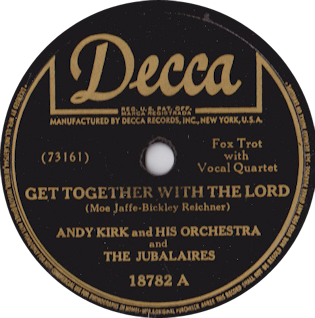 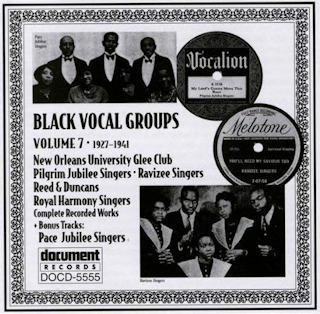 |
| Name: | Rust College Quartet |
| Aka: | Invicible Quartet of Rust college |
| Location: | Holly Springs, MS |
| Biography Synopsis: | |
| Recording career: | 1927-1928 |
| Most popular song(s): | |
| References / links: | Discography of American Historical Recordings |
| Images: | 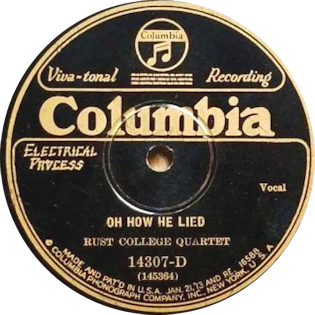  |
____________________________________________________________________________________________________________________________
 A B C D E F G H I J K L M N O P Q R S T U V W X Y Z
A B C D E F G H I J K L M N O P Q R S T U V W X Y Z
To help with further browsing click on the large ‘Initial’ to return to the Early Gospel Singers Introduction, or click another initial to take you to details of more early gospel singers.
____________________________________________________________________________________________________________________________
Please Note:
As this is a continuously developing website, several entries only give the names with no biographical details. Please be patient as these entries are included for completeness, indicating the details are ‘coming soon’ and will be added when time allows.
If there are any early (pre war) gospel singers missing from the lists that you think should be included, please email the details to alan.white@earlygospel.com. Thank you in advance for your assistance.

